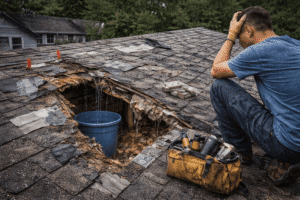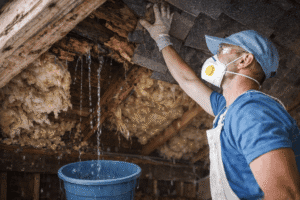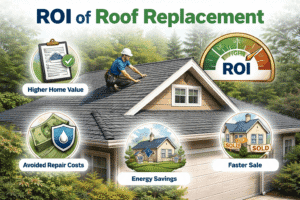Building or replacing a deck is one of the most rewarding upgrades you can make to your home — but choosing the best decking material is just as important as the design itself. In the Puget Sound region, homeowners face unique challenges: constant rain, moss growth, damp winters, and fluctuating temperatures. The wrong material can warp, rot, or require endless maintenance, while the right choice can give you decades of beauty and durability with minimal upkeep.
This guide breaks down the best deck materials for 2025, including Cedar Decking, Composite Decking, and PVC Decking — along with premium brands like TimberTech, Aspire Pavers by Brava. You’ll discover the pros, cons, and long-term value of each so you can confidently choose the decking option that fits your home, your budget, and the Northwest climate.
Whether you’re in Seattle, Bellevue, or working with our expert Lake Tapps deck contractors, this article will help you compare your options and plan your project with confidence.
Contact our deck replacement contractors now for a free estimate.
Overview of the Best Decking Materials
Choosing the right decking material comes down to more than looks — it’s about finding the balance between durability, maintenance, and cost that fits your lifestyle in the Pacific Northwest. Here’s a quick breakdown of the best decking materials for 2025, with links to our in-depth guides so you can explore each option further:
Cedar Wood Decks
A timeless favorite for Northwest homes, cedar brings warmth and natural beauty but requires consistent upkeep to protect against rain and moss.
Learn more → Cedar Decking
Composite Decking
Known for being low-maintenance and long-lasting, composite is ideal for busy homeowners who want the look of wood without the constant care.
Learn more → Composite Decking
PVC Decking
Ultra-durable and resistant to moisture, PVC is one of the best options for homes near water or in areas prone to heavy rain.
Learn more → PVC Decking
TimberTech Decking
A premium composite brand that offers advanced capping technology, stylish finishes, and long warranties.
Learn more → TimberTech Decking
Aspire Pavers by Brava
A sustainable and innovative alternative to traditional decking, Aspire combines style with eco-friendly performance.
Learn more → Aspire Pavers
Trex Decking
One of the most popular composite brands, Trex offers a wide range of colors and textures at accessible price points.
Learn more → Trex Decking Cost Guide
Cedar Wood Decking – Natural Beauty, Higher Maintenance
Cedar has long been the classic deck material in the Pacific Northwest, prized for its natural beauty and timeless appeal. Its warm tones and authentic wood grain bring a true Northwest look that blends seamlessly with outdoor spaces.
Pros of Cedar Decks
- Warm, natural aesthetic – Cedar delivers that rustic charm many homeowners love, perfect for creating a cozy outdoor living area.
- Local feel – As one of the most common wood decking materials in our region, cedar is often sourced from nearby forests, giving it a familiar Northwest identity.
- Naturally resistant to insects – Compared to untreated softwoods, cedar holds up better against bugs and pests.
Cons of Cedar Decks
- Ongoing maintenance required – To keep cedar looking great, you’ll need to seal, stain, or paint it regularly. Without care, it can fade to gray.
- Prone to moss and moisture damage – In damp climates like Bellevue, Seattle, and Lake Tapps, cedar can attract moss and rot faster than synthetic options.
- Shorter lifespan – Even with maintenance, cedar generally won’t last as long as composite, PVC, or other modern alternatives.
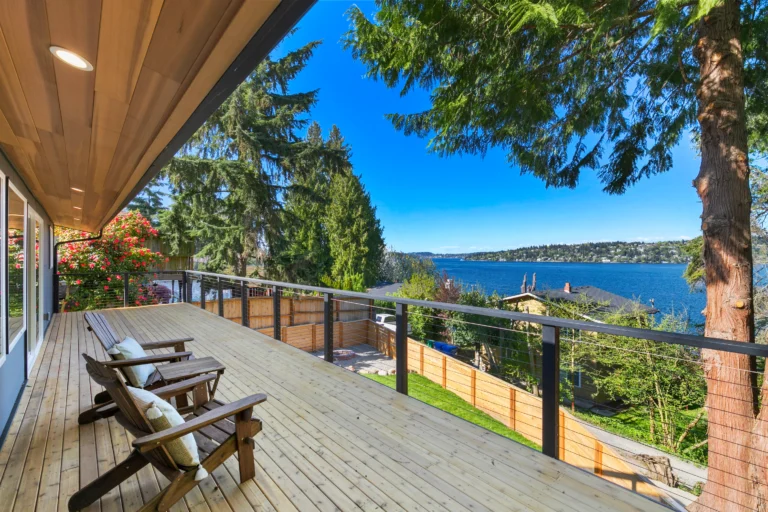
Composite Decking – Low-Maintenance and Long-Lasting
For many homeowners in the Puget Sound, composite decking has become the go-to choice for durability and convenience. Made from a blend of wood fibers and recycled plastic, composite boards are designed to resist fading, warping, and splintering—perfect for busy families who want more time enjoying their deck and less time maintaining it.
Why Choose Composite Decks
- Fade- and stain-resistant – Unlike natural wood, composite decking holds its color season after season.
- Durable in Northwest weather – Built to handle heavy rain, moss, and temperature shifts common in Seattle and Bellevue.
- Low-maintenance – No sanding, staining, or sealing required. A simple wash keeps it looking fresh.
- Family-friendly – Smooth, splinter-free surfaces make it safe for kids and pets.
Learn more about materials, benefits, and installation on our dedicated Composite Decking page.
Trex vs. TimberTech – Comparing Leading Brands
Two of the most popular composite decking brands in the Northwest are Trex and TimberTech. Both offer long-lasting, stylish solutions, but they have some key differences:
- Trex – Known for affordability and wide availability, Trex provides solid durability and a range of colors. Homeowners love it as a practical choice for a modern deck.
See our full Trex Decking Cost Guide
- TimberTech – A premium composite brand, TimberTech features advanced capping technology for superior moisture resistance and long-term performance.
Explore our TimberTech Decking options.
Whether you choose Trex or TimberTech, our team ensures expert installation that maximizes performance and longevity.
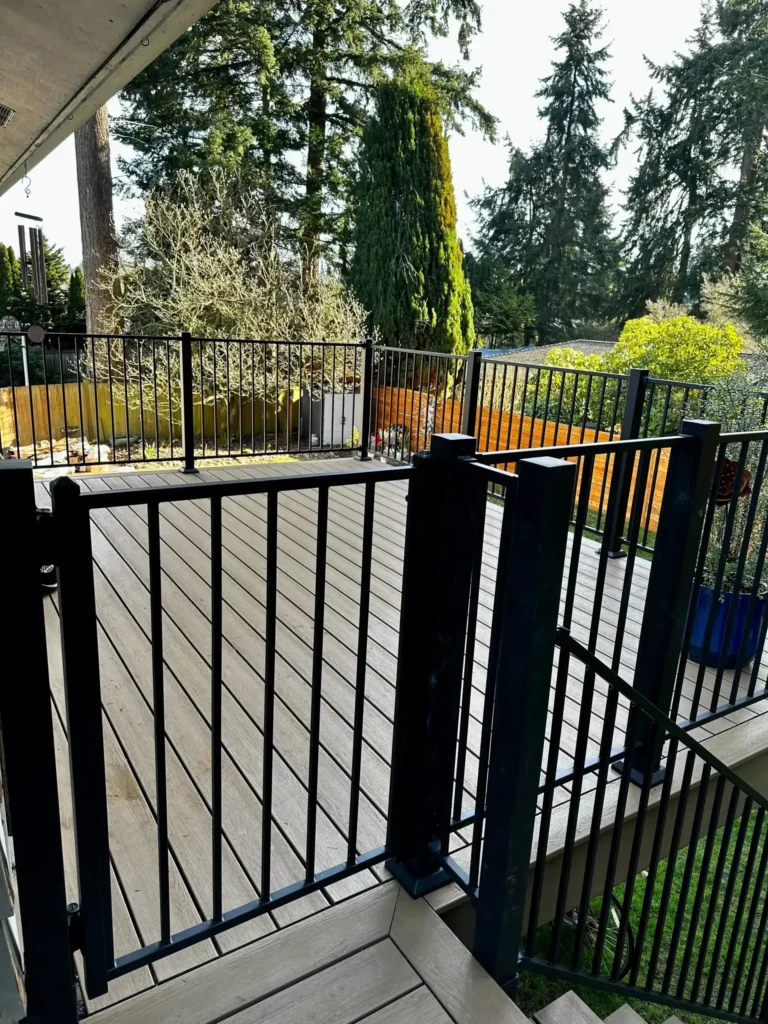
PVC Decking – The Most Durable Choice
When it comes to decking built for the Pacific Northwest climate, PVC stands out as the strongest option available. Unlike wood or even traditional composites, PVC boards are made entirely from synthetic polymers—meaning they won’t absorb moisture, rot, or warp over time. For homeowners in moisture-heavy areas like Lake Tapps, this makes PVC one of the smartest long-term investments.
Benefits of PVC Decking
- Low maintenance – No staining, sanding, or sealing needed—just occasional cleaning.
- Moisture resistance – Ideal for rainy climates, preventing mold, mildew, and moss buildup.
- Durability – Resists cracking, fading, and insect damage better than most other decking materials.
- Comfort & safety – Many premium PVC boards are slip-resistant and stay cooler in the sun compared to darker composites.
Cost vs. Long-Term Value
While PVC decking often comes with a higher upfront cost than cedar or composite, its long-term value is hard to beat. With minimal maintenance and lifespans that often exceed 30–50 years, homeowners save thousands over time by avoiding frequent repairs, replacements, or heavy upkeep.
If you’re looking for the most worry-free, durable deck option in Puget Sound, PVC delivers unmatched performance that makes the investment worthwhile.
Aspire Pavers by Brava – Sustainable, Stylish Decking Alternative
For homeowners who want something modern, eco-friendly, and built to last, Aspire Pavers by Brava offer a unique alternative to traditional wood or composite decks. Made from 95% recycled materials, these pavers are as sustainable as they are stylish—giving you a deck that reduces environmental impact without sacrificing performance.
Why Choose Aspire Pavers?
- Eco-friendly construction – Manufactured from recycled plastics and sustainable materials, making them a greener choice for your outdoor space.
- Modern design – Sleek, clean lines create a contemporary look that works beautifully with Northwest architecture.
- Durability – Resistant to cracking, staining, and weather damage, Aspire Pavers are ideal for the rainy, moss-prone conditions of Puget Sound.
- Low maintenance – No staining or sealing required—just simple cleaning to keep them looking great year-round.
Perfect for Puget Sound homeowners who want a deck that’s both eco-conscious and built for long-term performance, Aspire Pavers by Brava combine sustainability with a sleek, modern aesthetic that elevates any outdoor living space.
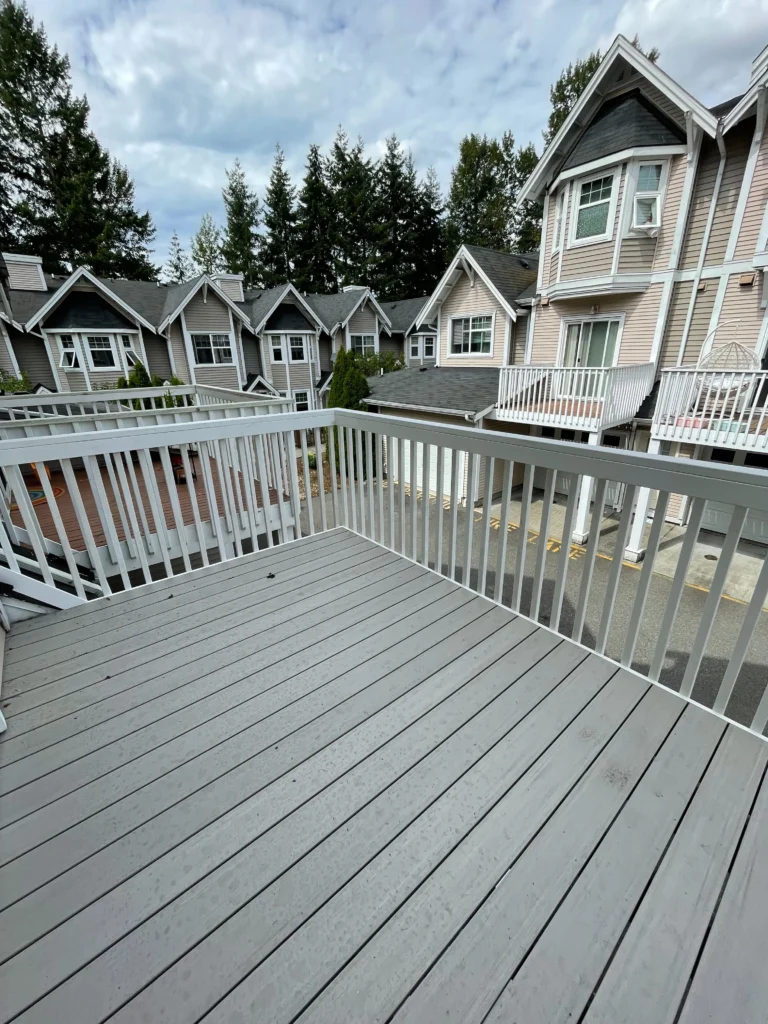
How to Choose the Best Decking Material for Your Home
With so many options available—cedar, composite, PVC, TimberTech, Aspire Pavers, and Trex—the question becomes: which is the best decking material for your home? The answer depends on your budget, lifestyle, and how your deck will handle the unique climate of the Pacific Northwest.
Consider Your Budget
If you’re looking for a budget-friendly solution, pressure-treated or cedar wood may be appealing, but keep in mind the ongoing maintenance costs. Composite, PVC, and Aspire Pavers have higher upfront costs but deliver long-term savings through durability and reduced upkeep.
Maintenance Requirements
Do you want a classic wood deck that needs seasonal sealing, or would you prefer a low-maintenance option? Composite, PVC, and Aspire Pavers are ideal for homeowners who don’t want the hassle of constant upkeep, while cedar is perfect if you love the natural Northwest look and don’t mind regular care.
Durability & Climate Resistance in Puget Sound
In the Puget Sound area, rain and moss growth are constant challenges. Composite, PVC, and Aspire Pavers perform exceptionally well in wet conditions, while cedar offers beauty but requires more protection to withstand moisture.
Aesthetic Preferences & Home Value
Each decking material brings a unique style. Cedar provides warmth and traditional appeal, while composite and PVC offer modern versatility with many colors and finishes. Aspire Pavers deliver a sleek, contemporary look that can increase property value for homeowners seeking something different.
Planning a new deck? Check out our full guide on the cost to replace a deck to help you budget with confidence.
Preparing for a Deck Replacement
Replacing a deck is a big project, and the right preparation can save you time, money, and stress. Before hiring a contractor, take time to plan your goals, timeline, and budget.
- Planning: Think about how you’ll use your deck—whether it’s for hosting gatherings, creating a quiet retreat, or adding property value. Your intended use will help determine the right size, layout, and materials.
- Timing: In the Pacific Northwest, the best time for deck replacement is typically late spring through early fall, when the weather is dry. However, reputable contractors can work around the seasonal challenges of rain and moss growth common in Bellevue, Seattle, and Lake Tapps.
- Budgeting: Costs vary depending on materials, square footage, and additional features like railings, stairs, or built-in seating. Cedar may be less expensive upfront, while composite and PVC decks cost more initially but require far less maintenance over time.
For a full breakdown of how to get ready, check out our homeowner guide on how to prepare for a deck replacement
Best Deck Material for Seattle, Bellevue, and Lake Tapps Homes
When homeowners search for the best deck material near me, the right choice often depends on where you live in Puget Sound. Each city has unique conditions that impact deck performance.
Seattle
Seattle’s damp climate makes moss and algae growth a common issue. That’s why materials like composite decking or PVC decking are top picks. Both resist moisture and require minimal upkeep, so you spend less time scrubbing and more time enjoying your deck.
Bellevue
In Bellevue, homeowners often prioritize long-term durability and upscale aesthetics. Options like TimberTech or Aspire Pavers by Brava offer a sleek, luxury look while still holding up against the rain. These materials also boost home value, making them an investment that pays off over time.
Lake Tapps
For waterfront homes in Lake Tapps, resistance to high moisture and constant exposure to water is critical. PVC decking and composite decking perform best, protecting your outdoor space from rot, swelling, and warping. Our Lake Tapps deck contractors specialize in materials designed for waterfront living, ensuring your deck stands strong for years.
Final Thoughts – Choose the Best Decking Material with Orca
Choosing the best deck material is one of the most important decisions you’ll make when upgrading your outdoor space. The right material impacts not only how your deck looks, but also how well it holds up against rain, sun, and heavy use over time.
At Orca Roofing & Exteriors, we work with all leading options—cedar, composite, PVC, TimberTech, Aspire Pavers, and Trex—to give homeowners the flexibility to match their budget, style, and maintenance preferences. Our team combines professional installation with expert guidance so you get a deck that’s both beautiful and built to last.
Ready to start your project? Contact Orca Roofing & Exteriors today for a free deck consultation and discover the best decking material for your home.
FAQs About the Best Decking Material
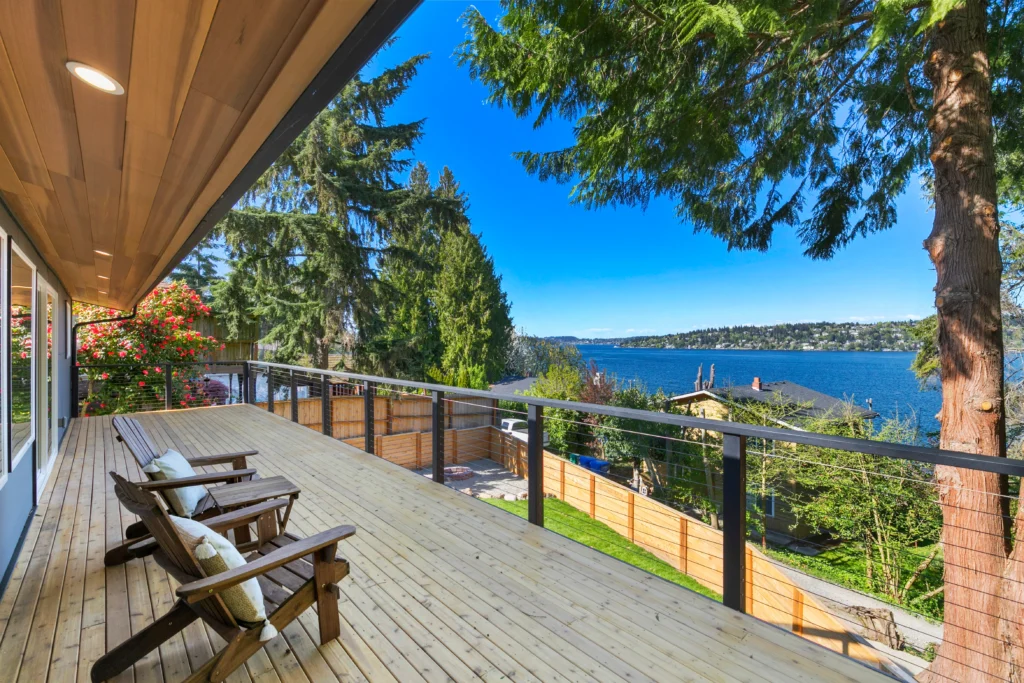
Which deck material lasts the longest?
PVC and top-tier composite (with full cap) typically outlast wood, often delivering 25–50+ years with minimal upkeep. Premium hardwoods like Ipe can rival that lifespan but require regular maintenance to stay protected and look their best.
What is the most affordable decking option?
Pressure-treated wood has the lowest upfront cost. However, ongoing staining, sealing, and repairs can make it more expensive over time than composite or PVC. If you’re optimizing for total cost of ownership, consider entry-level composite.
Is composite decking better than wood?
For most homeowners, yes. Composite offers low maintenance, strong fade/stain resistance, and won’t rot or splinter. Wood (like cedar) wins on natural aesthetics and lower upfront price, but needs regular sealing and is more vulnerable to moss and moisture.
How do I decide between PVC, composite, and cedar?
- PVC: Best for maximum durability and wet climates; minimal maintenance, higher upfront cost.
- Composite: Great all-around choice—durable, attractive, and low maintenance with broad style options.
- Cedar: Classic look and lower initial price, but higher maintenance and shorter lifespan in damp regions.
Is Trex or TimberTech better?
Both are leading composite brands. In general:
- Trex: Strong value, wide availability, solid warranties.
- TimberTech: Broad lineup (composite & PVC), advanced capping, premium textures, long warranties.
The “better” pick depends on budget, color/texture preference, and whether you want composite or PVC.
